ASA Activist Newsletter - February 2022
In the February 2022 Issue:
- ASA Releases State of the States Report
- Mississippi Enacts New Medical Cannabis Program
- New Cannabis Enigma Podcasts Include Women’s Health
- Cannabis Patient Care Magazine Features ASA Activists
- SF Bay Area Chapter Celebrates 20 Years
- Activist Profile: Crista Eggers, Nebraska
- Action Alert: Share the SOS Report with Your State Lawmakers
______________________
ASA Releases State of the States Report
Americans for Safe Access released this month its 8th annual report grading the effectiveness of each state cannabis program in the US. A virtual press briefing on the report was held on February 22.
ASA’s 2021 State of the States Report: An Analysis of Medical Cannabis Access in the United States (SOS Report) reveals that while many states continue to improve, no state is close to doing all it can to serve the needs of its patients.
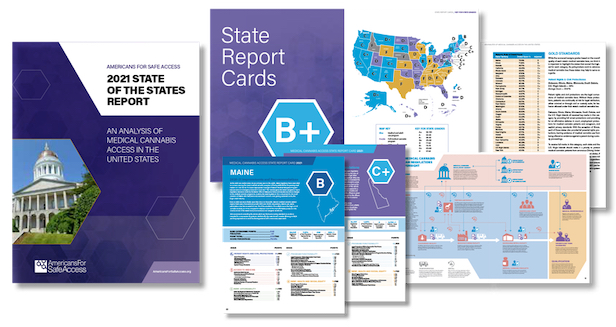 The SOS Report evaluates state cannabis programs using a rubric that reflects the key issues affecting patients. Grades for each state are assigned based on scores in over 100 categories, including barriers to access, civil protections, affordability, health and social equity, and product safety as well as penalties for harmful policies. New for this edition is an updated rubric that puts more emphasis on civil protections for patients.
The SOS Report evaluates state cannabis programs using a rubric that reflects the key issues affecting patients. Grades for each state are assigned based on scores in over 100 categories, including barriers to access, civil protections, affordability, health and social equity, and product safety as well as penalties for harmful policies. New for this edition is an updated rubric that puts more emphasis on civil protections for patients.
At 25 years since the first medical cannabis law went into effect, the average grade among states was only 44%, with the highest score being 76%.
“Without legislative improvements in state medical cannabis programs, millions of patients are left with limited or no access,” said Debbie Churgai, executive director of Americans for Safe Access. “This report should inspire a renewed commitment to patients by policymakers to improve state laws and remove the barrier of federal prohibition once and for all."
ASA distributes the report each year to state legislators and regulators in every state, as well as hundreds of health organizations and patient organizations. The SOS report is a key tool for activists and policy makers working to improve the implementation of medical cannabis laws in their states.
"Americans for Safe Access’ State of the States report has been an important resource for me as I work to ensure all Pennsylvanians have access to medical cannabis,” said Pennsylvania State Representative Chris Rabb. “As the largest cannabis patient advocacy group, their recommendations have helped me hone in on issues that impact patients, and work to pass improvements to better their lives. The report has also been a critical tool in educating my colleagues on the shortfalls of the current program and why improvements are necessary for Pennsylvanians.”
The report offers solutions for improvement to programs including legislative and regulatory language. Since its first edition in 2014, advocates and state legislators have utilized ASA’ report to pass new legislation and regulations to improve laws.
To learn about the top 5 takeaways from this year’s report, see ASA’s blog: www.safeaccessnow.org/sos21_blog1.
ASA also hosted a free public webinar on the report on February 23. That webinar can be viewed online at www.safeaccessnow.org/sos21_webinar_record.
The report and information about it are available at www.safeaccessnow.org/sos.
______________________
Mississippi Enacts New Medical Cannabis Program
On February 2, Mississippi became the 37th state to adopt a meaningful medical cannabis law. The new law, crafted by the state legislature, will allow limited access for some patients. It replaces a ballot measure more than 74% Mississippi voters approved in November 2020.
Mississippi law allows the state legislature to reject voter initiatives, and it did. On January 26, they instead passed SB 2095, a watered-down bill that imposes limits on both patients and the businesses that will serve them. THC content will be restricted, and patients may purchase no more than 1/8th of an ounce of cannabis a day, and no more than 3 ounces for a month. Municipalities will be able to ban medical cannabis businesses entirely, and, in those jurisdictions that permit cannabis businesses to operate, they will be kept in industrial or agricultural zones.
Qualified patients will have the right to possess and purchase cannabis, but little else. The law does not protect parental, housing or employment rights, though it contains provisions allowing minors to receive medical cannabis at schools.
State agencies have 6 months to begin licensing cannabis businesses, so patients can expect an operational system by summer 2022.
For more about Mississippi’s new law and why it represents a case study in legislative obstruction, see ASA’s blog at www.safeaccessnow.org/ms_law_casestudy.
______________________
 New Cannabis Enigma Podcasts include Women’s Health
New Cannabis Enigma Podcasts include Women’s Health
New Cannabis Enigma podcasts are available. Recent episodes include Codi Peterson interviewing Melanie Bone, MD, about cannabis and women's health, the role of minorities in cannabis with Steven Philpott, Jr., and the potential of cannabis in treating traumatic brain injuries with nurse Nikki Lawley, who was profiled in ASA’s April 2021 newsletter.
Produced by The Cannigma in partnership with Americans For Safe Access, podcast episodes are available at https://www.safeaccessnow.org/podcasts.
______________________
Cannabis Patient Care Magazine Features ASA Activists
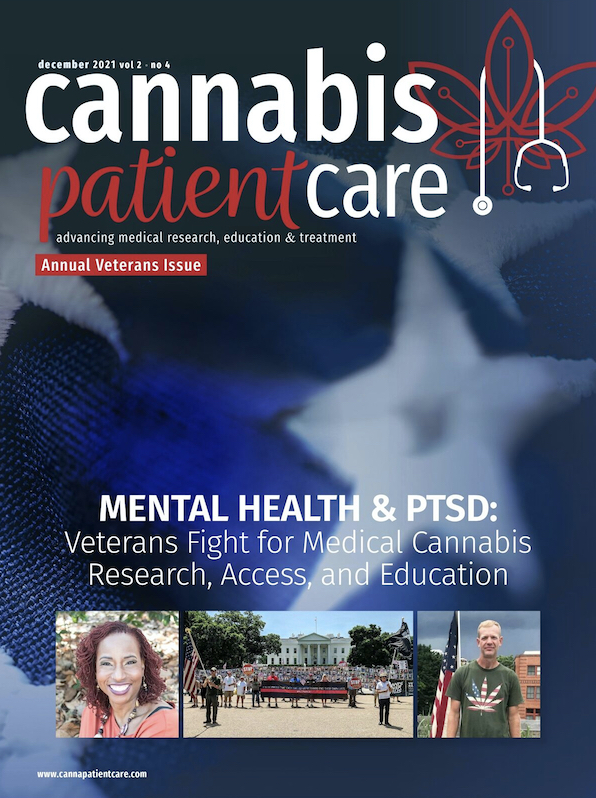 Veterans using cannabis for PTSD and mental health is the focus of the December 2021 issue of Cannabis Patient Care magazine, and several ASA activists are featured. Free access to Cannabis Patient Care is one of the perks of ASA membership.
Veterans using cannabis for PTSD and mental health is the focus of the December 2021 issue of Cannabis Patient Care magazine, and several ASA activists are featured. Free access to Cannabis Patient Care is one of the perks of ASA membership.
Among the featured advocates are Doug Distasio and Todd Scattini, both retired U.S. service members who are now working to ensure safe access to medical cannabis for their fellow veterans. Regular readers of the ASA newsletter may remember their inspiring stories from their activist profiles in October 2020 and February 2019, respectively.
Also featured are two nurses who have worked with ASA, Cherissa Jackson, who served multiple tours as a combat nurse and was profiled in ASA’s November 2020 newsletter, and Elizabeth Mack, who collaborated with ASA on a cancer care webinar in August 2021.
Scattini and Jackson were also among the distinguished panelists for ASA’s Veterans’ Roundtable in 2020, which can be viewed on the ASA website at www.safeaccessnow.org/vets20_video.
______________________
Bay Area ASA Chapter Celebrates 20 Years
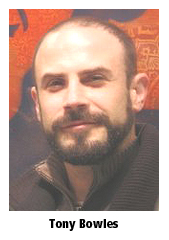 The San Francisco Bay Area chapter of Americans for Safe Access marked its 20th anniversary this month with an online party. The celebration, which included a photo montage of memories, was held as a virtual gathering due to Covid.
The San Francisco Bay Area chapter of Americans for Safe Access marked its 20th anniversary this month with an online party. The celebration, which included a photo montage of memories, was held as a virtual gathering due to Covid.
The event, sponsored by Eaze, Sava, Apothecarium and BASA, included a raffle, a DJ who has played at Bay Area ASA events since the beginning, comedy and special guests.
“It was just like old times,” said longtime chapter activist Tony Bowles, who was a plaintiff in one of ASA’s first successful lawsuits against a state agency. “Comedian Ngaio Bealum brought the laughs, DJ Selekta Lou Sanchez brought the tunes, and Joe Sweetleaf brought the compassion -- plus there was a memorial to Jake Sassaman by Jacqueline Patterson.”
The Bay Area chapter of ASA is the oldest and most active in the US. ASA was founded 20 years ago in response to a coordinated set of federal raids and arrests targeting locally licensed medical cannabis providers in the San Francisco Bay Area.
“The fight for safe access is not over,” said Bowles. “We are already getting the sense that this cannabis legislative cycle is going to be busy. We look forward to harnessing this energy as we move forward.”
See the historical photo montage on YouTube at youtu.be/xk2JX4EyS5Y. Follow Bay Area ASA at facebook.com/BayAreaASA.
______________________
Activist Profile: Crista Eggers, Omaha, Nebraska
Most medical cannabis activists become advocates for safe access because they’ve had direct experience treating a medical condition with cannabis. Crista Eggers is not one of those. She became a committed activist because cannabis is prohibited in her state, even for her seriously ill child with intractable epilepsy.
“We are in a state where there is no medical cannabis law, where there is no CBD law, so we still do not know if this is an option that can help our child,” says Crista. “But it’s helping people like our son in states next to us, so we hope to bring that option, that access, that right to Nebraska.”
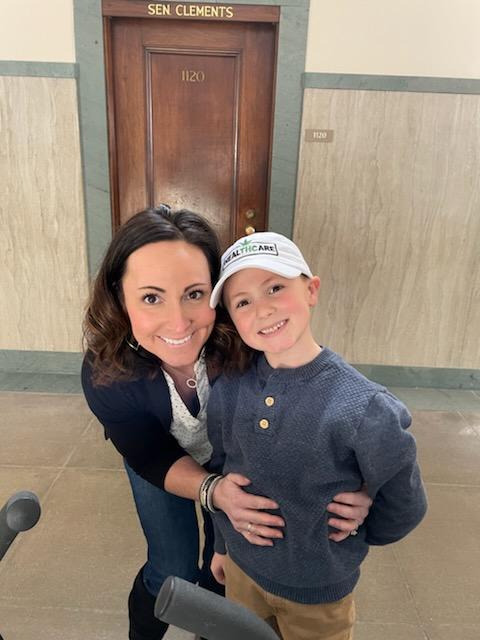 Nebraska represents one of the rare holdouts among US states in forbidding use of cannabis even by the seriously ill. Yet it’s available in its neighboring states.
Nebraska represents one of the rare holdouts among US states in forbidding use of cannabis even by the seriously ill. Yet it’s available in its neighboring states.
Colton, now age 7, suffers from constant seizures on a daily basis, ranging from the violent tonic-clonic to absence and complex partial seizures. Since he was diagnosed with epilepsy at age 2, Colton has been prescribed 20 different medications in nearly 100 different combinations. Nothing has worked. In fact, his condition has worsened, and many of the medications have produced side effects including nausea, dizziness and headaches. The worst was a serious allergic reaction that put Colton in the hospital for 11 days.
“His body shutdown from a medication that is studied and FDA approved. We came close to losing our child because of this medication,” says Crista. “Every day my stomach churns knowing we’re making the decision that we think is best, which is continuing these meds, even though they don’t seem to be doing a lot.”
Colton’s doctors say they’ve exhausted all available pharmaceutical treatments, all anti-convulsant and epilepsy medications. Except cannabis, because it’s not legal in Nebraska. Obtaining it illegally could mean criminal charges for Crista and loss of parental rights.
“We don’t want to be criminals, but unfortunately so many people are forced to become criminals as patients,” says Crista. “We’re struggling to know if we’re helping him with these meds or hurting him, particularly now that he’s older and can tell us how incredibly sick he feels.”
The number of medications Colton takes require constant bloodwork to monitor their effects, bloodwork that could reveal if he had been given any cannabis-based medications.
In 2019, once it became clear the doctors in their state couldn’t offer any more help, the Eggers went to Minnesota to see epilepsy specialists. After testing Colton, the subject of cannabis came up.
“Those conversations were very limited and very difficult,” says Crista. “The doctors said, ‘I would suggest you either move to a state where medical cannabis is legal, so that we can try this for Colton, or you go back home and you try to get it legalized.”
Rather than become another family of medical refugees, the Eggers decided to return home and fight for safe access for Colton and other families.
“I thought, how hard can that be?” remembers Crista. “I don’t think many people would disagree that, watching a child suffer, if there is something that could give even the slightest hope of helping them, everybody would be on board with that. Who would be against that?”
Two days after that conversation with the doctors, Crista was at the capitol in Lincoln testifying at a hearing on a medical cannabis bill introduced by state Senator Anna Wishart.
“Really quickly, I realized this was far bigger than my child or my story of trying to help my child,” says Crista. “I met many parents who have been fighting this for years, many who have become criminals to help their child and others like us who don’t want to risk losing our children, but also know that’s what’s happening is not right.”
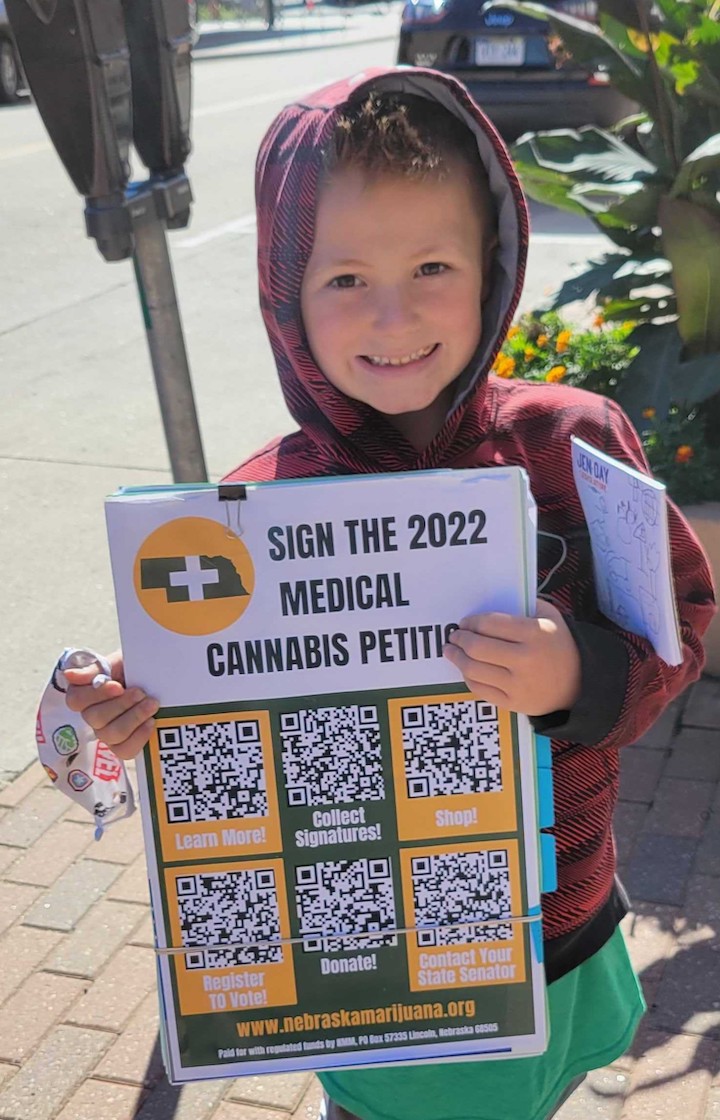 That’s when Crista became a volunteer for Nebraskans for Medical Marijuana and became active in the legislative process.
That’s when Crista became a volunteer for Nebraskans for Medical Marijuana and became active in the legislative process.
Crista and other Nebraska advocates thought they had a good shot at changing their state’s law through a 2020 ballot initiative. But after they submitted signatures and it was certified by Nebraska’s secretary of state, the state supreme court stepped in to remove it from the ballot. In answer to a lawsuit filed by a local sheriff, the court ruled in a split decision that the voter initiative violated a requirement that such measures only deal with a single subject.
In the majority’s view, creating a right to use and possess medicinal cannabis was a different purpose than creating a system for regulating the production and distribution of cannabis, though the two dissenting justices wrote that the court had “squeezed the concept of single subject” so much that they had diminished the rights of voters.
After that disappointment, Nebraska advocates have returned with a pair of complementary initiatives that would together accomplish what the 2020 measure intended.
“Being Nebraska, we’re going on nine legislative sessions since medical cannabis was brought up,” says Crista. “We’ve had some educational opportunities, and the advocacy in the state, the support is strong, but it’s tough to look in the face all the people who’ve been fighting so long.”
Crista never envisioned that she would take on something like medical cannabis advocacy, but her involvement has helped her deal with her family’s challenges that tragically echo in the stories she hears from other parents.
“To be a part of something in the midst of that pain and suffering, to be working toward bringing greater awareness and making lives better, that’s been something I can hold on to,” says Crista. “Sometimes you can see measurable change, even just in conversations with people. That can be very therapeutic.”
Through her advocacy, Crista has come to recognize that her family is not alone in this. She has seen how the stories of families like hers help change the narrative and educate people, breaking down the stigma.
“No matter who you are, we can all agree that we want to make human suffering better,” says Crista. “That’s why it’s such an honor to be in this space and to be working with an organization that is telling those stories.”
Signature gathering is underway for Nebraska’s 2022 ballot initiatives to establish safe access. To find out more, visit the website for Nebraskans for Medical Marijuana at nebraskamarijuana.org or follow them on facebook at facebook.com/NebraskaMJ.
______________________
 Action Alert: Share the SOS Report with Your Lawmakers
Action Alert: Share the SOS Report with Your Lawmakers
ASA’s annual State of the States Report is a key lobbying tool to help show lawmakers what can be done to improve safe access for patients in their state. It just takes a few minutes to share the report with your state lawmakers and urge them to adopt better legislation and regulations. Take action today at https://www.safeaccessnow.org/sos21_action.
______________________
Download a PDF of this newsletter to print and share!
______________________
Share this page






















